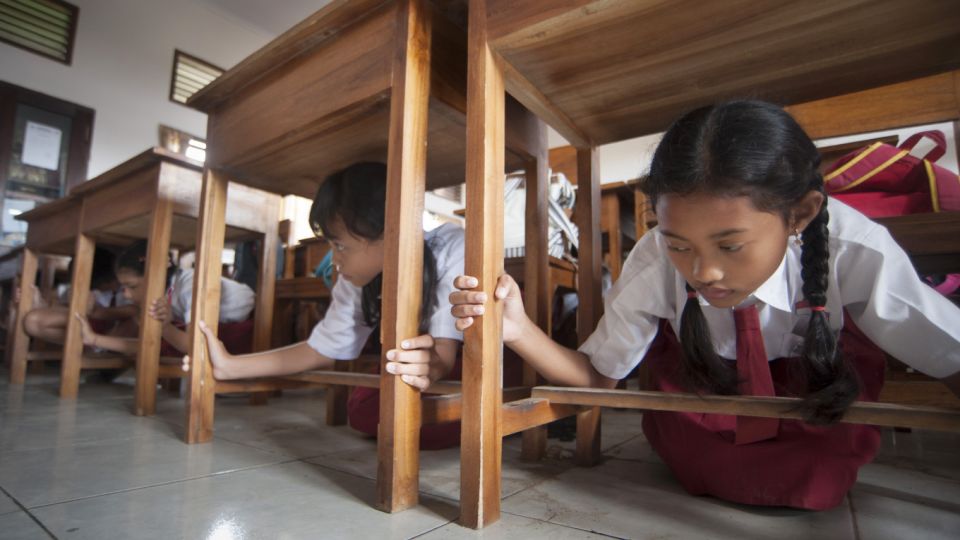May 27, 2022
JAKARTA – An “earthquake” shakes Tanjung Benoa village in Bali and hundreds of local elementary students hide under their desks. Once the earthquake stops and a tsunami warning is announced, they run into a four-story hotel building near the school.
They take their schoolbags with them, putting them on their heads to protect them from falling debris.
This was a simulation for thousands of students on Tuesday as part of a tsunami-preparedness drill that was held on Tuesday, during the fifth World Reconstruction Conference (WRC5) in Bali.
The drill was held by the United Nations Development Programme (UNDP), in partnership with Indonesia’s Disaster Management Agency (BNPB) and the Badung Disaster Management Agency.
The conference was organized in conjunction with the Seventh Global Platform for Disaster Risk Reduction (GPDRR).
“I feel nervous, a little bit scared, but happy as I can participate in this drill,” said one of the participating students.
United Nations Deputy Secretary-General Amina J. Mohammed underlined the importance of early action to mitigate the impact of disasters.
Mohammed said the COVID-19 pandemic and the climate crisis, as disasters posing a major threat to the achievement of the UN Sustainable Development Goals, should change the world’s risk calculus.
“The pandemic’s impacts serve as a reminder of how disasters touch every aspect of life, from health to education, to work and livelihoods, to gender equality, to nutrition, to peace and security,” she said.
“Disaster has the potential, in minutes and hours, to wipe away the results of years and decades of development work. That is why it is so urgent we do everything we can to mitigate the risks disasters pose,” Mohammed said.
“Students in Bali, like hundreds of millions of students around the world, showed incredible resilience and adaptability in the face of the pandemic. Together, we found ways to protect and support one another, to ensure studies could continue, and we did our best to prevent anyone from being left behind,” she added.
The WRC5 was held on Monday and Tuesday in Bali under the theme “Reconstructing for a sustainable future: Building resilience through recovery in a COVID-19 Transformed World”. The WRC5 provided a global platform for policymakers, experts, practitioners from governments, international organizations, non-governmental organizations, academia and the private sector to come together to share experiences in disaster recovery and reconstruction and take forward the policy dialogue.
It noted how over two years since the COVID-19 pandemic began, the world has profoundly changed, as have the opportunities for social, infrastructural and economic recovery. The impacts of the pandemic have been compounded by other natural disasters, conflicts and crises.
The WRC is traditionally organized by three partners, namely, the European Union, the UNDP and the World Bank in conjunction with the Global Platform for Disaster Risk Reduction. This year, the International Recovery Platform joined as a partner.
“Post-disaster recovery is an opportunity to reset the development pathway toward a greener and more resilient future,” said Asako Okai, UN assistant secretary-general and director of the UNDP’s Crisis Bureau.
The WRC5 addressed the unprecedented socio-economic recovery needs as a pathway to rebuilding a resilient and sustainable society in the post COVID-19 world.
The conference was organized under three sub-themes. The first was addressing the social and economic effects and impact of the pandemic on development gains; the second, the opportunity to reset the development pathway toward a greener and more resilient future and third, rethinking recovery governance models in the post COVID-19 world.
“COVID has been such a big challenge. We need to do things differently. At the same time, many lessons have already emerged from the last two years. So, it is time for us to pick what we can do,” Okai emphasized.
The UN noted that in 2021, Indonesia recorded 3,092 disaster events – equivalent to eight disasters a day – while the devastating Indian Ocean earthquake and tsunami of 2005, and the Palu earthquake and tsunami of 2018 remained fresh in the memory of the Indonesian people.
“Unfortunately, the climate emergency is only going to make disasters occur at a higher frequency and with more severity,” Mohamed said.


